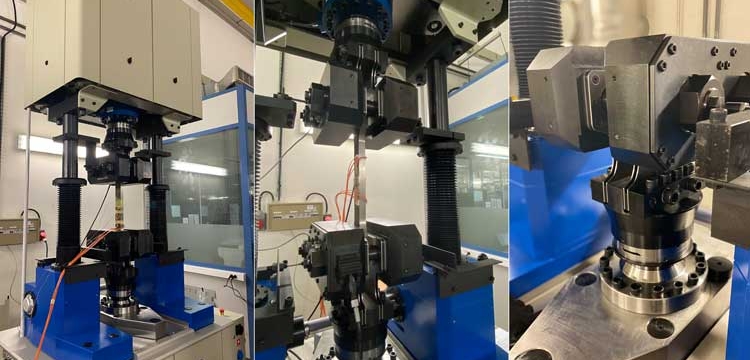High capacity 550 kN vibrophore to load your test specimens (maximum: 850mm) at frequencies of up to 150 Hz, reducing the overall testing time.


Characterization of materials in fatigue
Your expectations
To validate the fatigue life of a part, the material must firstly be characterised on test specimens. The objective is to:
- Identify the behaviour laws of the material,
- Evaluate the endurance limit and plot the S/N curve (Wöhler curve),
- Compare the fatigue response of different manufacturing processes,
- Assess the potential drifts of your processes during the “series production”,
- Carry out fracture mechanics testing (K1C, da/dN, J1C, etc.)”
Our solutions
Comprehensive support from test definition to interpretation of results (behaviour laws for materials & test/calculation correlations)
To meet the needs of industrial manufacturers, Cetim has developed a distinctive approach allowing you to :
- Optimise the service time through a specific experimental plan and a test matrix that includes just the required tests offered by our experts,
- Characterise your materials at elevated temperatures (high-temperature cryogenics) and in harsh environments.
- Correlate the test data to the calculation data using contactless methods (e.g.: correlation of digital images) and/or instrumentation.
- Develop specific test methodologies, such as composite materials,
- Train you on material fatigue phenomena with our complete Cetim Academy® training offer
ZOOM ON HYDROGEN
HyMEET, our technological platform dedicated to H2, provides mechanical engineering with resources and skills needed to master low-carbon hydrogen production, distribution, storage and utilization technologies. HyMEET combines an ambitious R&D program with a €25 million investment in resources dedicated to characterization and validation tests (up to 1000 bar and in a range of temperatures from deep cryogenics to high temperatures) as well as consulting and training.
Its activities are dedicated to:
- Characterizing the behavior of materials in contact with hydrogen
- Development of specific test methods
- Characterization of specific mechanical equipment and systems in severe hydrogen environments.
Our equipment enables:
- Mechanical characterization of materials using fatigue machines in a high-pressure hydrogen environment
- Control of sealing systems and plant containment, with test benches developed to study gas diffusion phenomena, resistance to rapid decompression and sealing performance under severe conditions
- The study of the ageing of test specimens in high-pressure autoclaves
- Tests under cryogenic conditions for the use of hydrogen in liquid form, with several cryostats fed by a helium-hydrogen liquefier
- Multiphysics tests with pressure, temperature and .... cycling.
- Manufacture of thermoplastic composite parts (tanks, tubes) by in-situ deposition and consolidation (in real time, with no further steps required) using our HySPIDE TP robotized cell.
Our specific services dedicated to the characterisation of materials in fatigue:
- Mechanical characterisation of materials in hydrogen environment (high pressure, gas mixtures and wide temperature range)
- Wide range of mechanical fracture tests
- Support in selecting and choosing compatible materials for H2 applications
Your benefits
- A customised, proven methodology applicable to a wide range of materials (metallic and non-metallic) and processes (forming & assembly, etc.)
- A unique range of machines providing support for significant volume of tests. Cetim has recently invested in a high capacity 550 kN vibrophore which can stress your specimens (maximum: 850mm) at frequencies up to 150 Hz, thus reducing the overall duration of tests
- Our industrial expertise and cutting-edge resources enable us to carry out multiphysics tests under severe stresses.
- Cofrac accredited testing (accreditation COFRAC No. 1-1014 - Scope available on www.cofrac.fr),
- Advice from an independent experts to help you determine the best testing campaign to ensure your products reliability.


